Is RON97 Really Better Than RON95? – Tried And Tested!
Is RON97 Really Better Than RON95? – Tried And Tested!

For the first time in history, petrol kiosks in Malaysia are experiencing a shortage of RON97 petrol, after demand for the fuel surged following a reduction in its price on Dec 1.
The high demand came after the Government scrapped subsidies for RON95 and diesel and implemented a managed float system, which resulted in a very low difference between the price of RON95 (RM2.26 per litre) and RON97 (RM2.46 per litre).
The price of RON97, which incidentally fell nine sen from RM2.55 to RM2.46 per litre in December 2014, saw some petrol kiosks double their sales of the fuel from an average of 500 litres to 1,000 litres in a day.
In February 2015, retail prices of RON95 and RON97 fell further to RM1.70 per litre and RM2.00 per litre, respectively.
However, prices of RON95 and RON97 went up by 20.5% and 22.5% in August to RM2.05 per litre and RM2.45 a litre respectively.
Here is a comparison of RON95 and RON97 prices from Dec 2014 to January 2017.
| Date | Price of RON97/litre | Price of RON95/litre |
|---|---|---|
| Dec 2014 | RM2.46 | RM2.26 |
| Jan 2015 | RM2.11 | RM1.91 |
| Feb 2015 | RM2.00 | RM1.70 |
| March 2015 | RM2.25 | RM1.95 |
| June 2015 | RM2.35 | RM2.05 |
| July 2015 | RM2.55 | RM2.15 |
| Aug 2015 | RM2.45 | RM2.05 |
| Aug 2016 | RM2.10 | RM1.75 |
| Jan 2017 | RM2.40 | RM2.10 |
Besides the reduction in price, the soaring demand for RON97 is no doubt fuelled by the longstanding belief that it is superior to RON95. It has also been regarded as the holy grail of fuels for many Malaysian drivers due to its steep price and therefore, greater exclusivity.
Over the years, there have been plenty of debates over the two types of fuel, with some claiming that pumping RON97 will boost engine efficiency and performance, while RON95 is not as good for your engine and may even cause it to clog up in the long run. But is RON97 really better than RON95?
To begin, we must first understand what this RON deal is all about. RON really stands for Research Octane Number, which is a standard measure of a motor or aviation fuel. The higher the octane number, the more the fuel can withstand compression before it detonates. Each type of engine is designed for a specific range of octane numbered fuels.
In general, higher octane fuels like RON97 are used for cars with higher performance engines.
You should avoid using fuel with an octane number that is lower than what your engine is built for, as this will result in “knocking”. Knocking occurs when the fuel detonates in the engine combustion chamber before it is supposed to, resulting in poor performance and may even ruin the engine.
Most cars in Malaysia are built to run on RON95 petrol. New development in engine technology has also allowed for some high compression modern engines to also run on RON95.
Judging from the drastic spike in RON97 demand, it is clear that many Malaysians still subscribe to the idea of RON97 being the superior fuel. But is it really? We look at some popular myths and beliefs surrounding the usage of the two fuels to provide an accurate measure.
Myth 1: RON97 can boost engine performance
The common belief is that engine performance can be improved by using fuel of higher octane than what is specified by the engine manufacturer. However, according to Auto.com.my, switching to a higher octane fuel has no proven effect on your engine performance and cannot help your engine develop more power. It’s just petrol, not Gandalf.
Certain fuel companies claim that the engine oil in vehicles using RON97 stays cleaner and for longer due to the lower heat generated in fuel combustion. It is also commonly thought that RON97 can clean up or absorb any deposits that may build up on vital engine parts like the valves. Such claims are widespread and are often taken as the gospel truth, though there have been no scientific data to back them up. Besides, how clean the fuel is has to do with the detergents used and not the combustion rating.
Myth 2: RON97 gives you more mileage
Another misconception that surrounds the two fuels is that using RON97 can actually give you more mileage than RON95.
According to Car Reviews N Care, the amount of mileage you get from your tank really depends more on traffic conditions and how you handle your car. Obviously, taking a congested route on a daily basis will cost you more fuel than a less congested route of the same distance (not that many of us have a choice). You are also more likely to obtain greater distances with your vehicle if you have a passive driving personality (or if you live outside of Kuala Lumpur). Reducing your speed and accelerating with moderation are some proven ways that can help you save fuel.
The moral of the story is, just because RON95 is sold at a cheaper price does not actually mean it is of a lesser quality or is inferior. It is simply a type of fuel that caters to specific engine requirements, just like how RON97 caters for higher performance engines. So, if your car’s engine is rated for RON95, stick to that as going to 97 will just cost you more without producing any better results.
More Malaysians are now able to afford the once-elusive RON97. However, unless your car manufacturer specifically tells you to use RON97, using this premium grade fuel will not actually rev up your car’s performance or give it a cleaner engine.
However, with the managed float system, the price gap between RON95 and RON97 is a mere 30 sens for every litre, or RM15 for every 50 litres, so it makes financial sense for the fuel consumer to opt for the higher grade fuel given their car’s engine requires it. The same amount of RON97 fuel would have cost you RM145 in March 2015 (when the price of RON97 peaked at RM2.90 per litre), and RM120.00 in January 2016.
| Date | RON97 (50 litres) | RON95 (50 litres) |
|---|---|---|
| January 2017 | RM120.00 | RM105.00 |
While these lower fuel prices are certainly a boon for Malaysian drivers, it is important to keep in mind that these prices are not a constant and can increase again if world crude oil prices go up.
When it comes to cars, everyone appears to be very concerned with fuel economy and performance. Recent fluctuations in petrol prices have further scintillated such conversations among Malaysian drivers.
So, which type of fuel offers the best mileage and performance? More importantly, how do we measure that and why does it matter?
Our recent article on RON97 versus RON95 has received overwhelming response from our readers. Majority of the feedback is against the article perpetuating that RON97 petrol does not actually give you more financial leverage than the cheaper RON95. We have dug deeper, and ran some tests with the help of automobile experts to measure the changes in horsepower and torque that entails the respective usage of the two fuel types.
How we did it: The “dyno” test
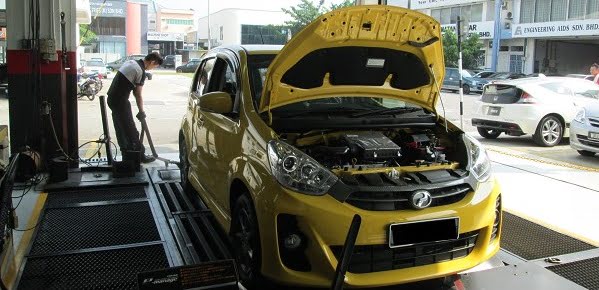
No Myvis were harmed in the making of our experiment
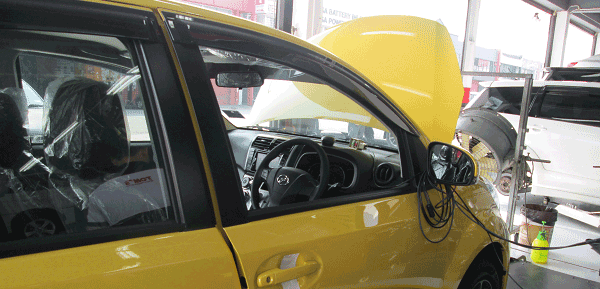
Here’s the dyno hooked to our car
For the purpose of this experiment, our experts used a dynamometer (dyno). A dynamometer is sort of like a treadmill for cars and is used to measure primarily horsepower and torque.
The reason why we use a dyno test is because it lets you test a vehicle in a controlled environment, limiting the number of variables in your test such as different road conditions, traffic or even driving styles.
To ensure our results were as consistent as possible we also used the same car and the same driver to conduct all the tests (no it wasn’t me).
Before we started, we drained a stock Myvi 1.5 completely off fuel, before filling it up with exactly one litre of RON97. Granted, you will definitely not drive like this most of the time on the streets, but again, we are trying to prove this test scientifically and therefore removing as many variables as possible.
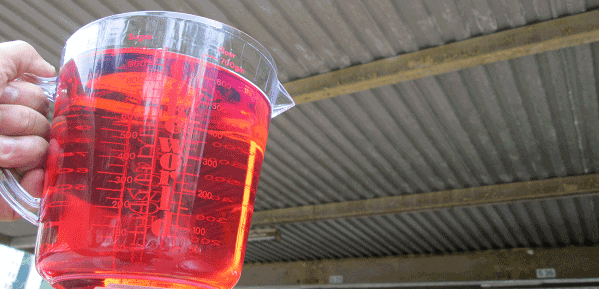
Everything about V-Power seems fast! it even looks fast
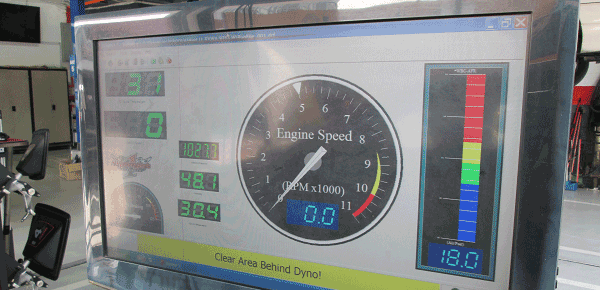
Is RON97 really better than RON95? We let the experts put it to the test
In this dyno test, the engine is revved to its maximum capacity repeatedly (for multiple tests) until the fuel tank is completely empty to calculate the amount of mileage*, horsepower and torque the engine can produce with one litre of RON97.
We repeated the exact same process with RON95 petrol afterwards. The output is measured and plotted on a graph. Our verdict?:
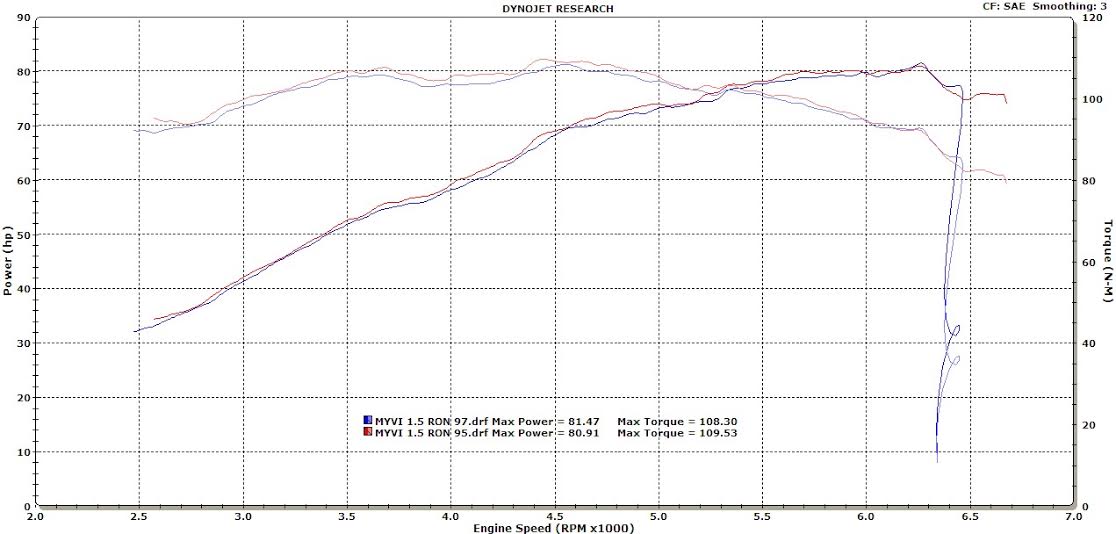
We came, we saw, we tested and here are the final test results! Read on for a more detailed explanation below.
1) RON95 gives you more mileage

Surprisingly, and contrary to popular belief, our dyno test revealed that RON95 actually gives you about 9.4% more mileage than RON97. While we drained the Myvi completely off fuel, there is a possibility of “old” fuel left in the fuel lines, but this should not affect the test results significantly.
Our dyno was not set up to measure mileage and we used the in-car tripmeter to measure this and we will admit that it was not the most accurate way to measure mileage in this scenario.
We tried to be as consistent as we could with each test run. However, it is worth noting that variables in real-life such as the load on your car, road conditions and even air resistance will cause this particular result to differ even more.
Even with the different variables, taking everything into account and giving the test a 5% margin of error, RON95 still gives you quite a bit more in fuel economy (especially considering it’s quite a bit cheaper than RON97).
2) Less than 1% horsepower difference between the two fuels at their PEAKS

Many people believe that engine performance and horsepower can be improved by using fuel of higher octane than what is specified by the engine manufacturer. Some even claim they experience a faster and smoother ride with the more expensive RON97.
While our dyno test demonstrates that our Myvi’s engine does indeed produce more horsepower with RON97 than with RON95, the difference is less than 1% and only occurs at about 6.3k RPM. This means it is unlikely have a noticeable effect in your daily driving experience.
We maintain that switching to a higher octane fuel has no proven effect on your engine performance and cannot help your engine develop more horsepower. Yoda, your fuel is not.
3) RON95 gives you more torque
An interesting result that we were not expecting: Our dyno test results showed than RON95 petrol produced slightly more torque than RON97.
Though the difference is very minimal, a Myvi on RON 95 would beat one running RON 97 in a short sprint. However, the slight difference in torque is unlikely to bring about a noticeable impact on your daily driving experience.
Which fuel is better?
While our findings consistently indicate that using RON97 petrol does not give you better mileage or produce any performance-enhancing benefits, it is worth noting that the Myvi 1.5 we used has been optimised for RON 95 fuel usage.
Referring to the graph above, RON95 consistently produces higher horsepower from RPM 2 to 6.3, where RON97 picks up at a short interval. The net effect is that you’re actually getting less power from your car by running it on RON97 versus RON95.
Conversely, if you do drive a car that specifically requires you to use RON97 (like the Suzuki Swift Sport), NOT using this premium fuel would likely cause your car to perform less efficiently.
The key takeaway here is, unless your car’s engine specifically requires RON97, there is really no point in spending more on premium fuel as it does not really give you an added performance advantage.
As of January 2017, under the managed float system, the price difference between RON97 and RON95 is a mere 30 sens for every litre, or RM15 for every 50 litres. Though the prices were much cheaper in the month before, the price difference was 35 sens per litre, or RM20 for every 50 litres in December 2016, when prices of RON97 and RON95 were RM2.25 and RM1.90 respectively for the month.
| Date | RON97 (50 litres) | RON95 (50 litres) |
|---|---|---|
| January 2017 | RM120.00 | RM105.00 |
The same amount of RON97 and RON95 petrol had cost just RM112.50 and RM95.00 respectively in December 2016 – about 6.7% and 1o.5% less than what we are paying in January 2017.
RON97 currently costs about 14.3% more than RON95, so it really does not make much financial sense for consumers to pay this premium if their car does not require it, and also given the fact that using RON95 for a RON95 engine will give you more horsepower, torque and mileage.
As the saying goes, “a penny saved, is a penny earned,” and saving a few bucks in fuel may just mean you will be able to have more on your plate of mixed “economy” rice (whose prices aren’t going down, by the way).




Comments